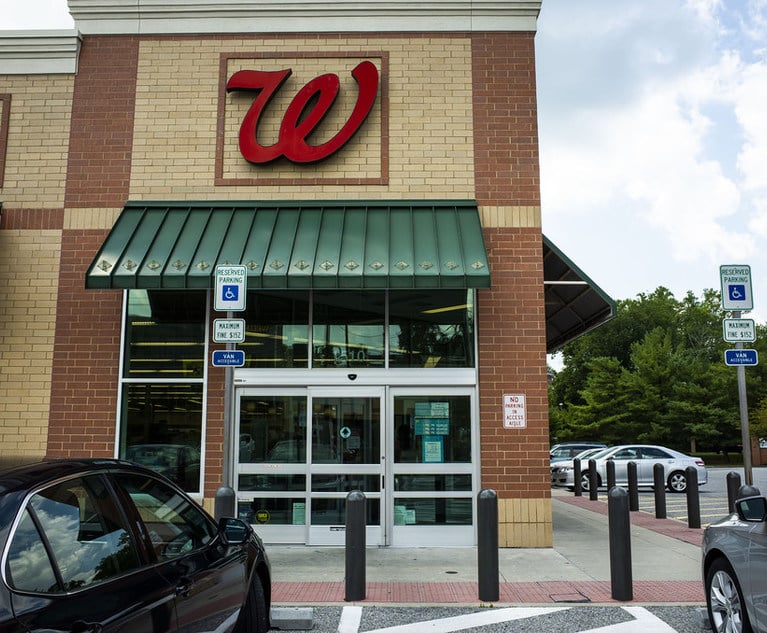 4 PM production/Shutterstock
4 PM production/ShutterstockNJ Leads the Way in Mandating Severance Payments for Laid-off Employees
On Jan. 21, 2020, New Jersey became the first state to mandate employee severance payments in the event of a closure of operations or mass layoff of employees.
March 10, 2020 at 10:30 AM
7 minute read
For nearly two decades New Jersey employers had to comply with the notice requirements of the Federal Worker Adjustment and Retraining Notification Act (WARN), 21 U.S.C. 2100 et seq., as well as New Jersey's similar counterpart, Millville Dallas Airmotive Plant Job Loss Notification Act (NJ WARN Act), N.J.S.A. 34:21-2. While not identical, both statutes require New Jersey employers with 100 or more employees to provide 60 days' written advance notice to those employees affected by a "mass layoff" or "plant closing" or a "termination of operations" or "transfer of operations" as those are defined under the respective statutes. Both laws require similar notifications to designated state and local officials. A failure to provide the required 60 days' advance notice could result in liability for wages and benefits for the period for which the notice was not provided to the affected employee.
As a result of the Toys 'R' Us bankruptcy filing in 2017, more than 30,000 workers were laid off nationally, and approximately 2,000 in New Jersey. Initially, these employees were not provided with any severance benefits but an ensuing battle ultimately resulted in the establishment of an assistance fund to provide some monetary relief to affected employees. Critics claimed that these benefits fell far short of what these workers should have been paid.
The Toys 'R' Us closures' effect upon the citizens of New Jersey did not go unnoticed by the state legislature. On Jan. 21, 2020, New Jersey amended the NJ WARN Act to become the first state to mandate employee severance payments in the event of a closure of operations or mass layoff of employees. The amendments also extend significant additional protections to New Jersey employees, making it the most progressive law of its kind in the country. The law goes into effect July 19, 2020.
Under current law, the NJ WARN Act only applies to those employers with 100 or more full-time employees who have been in operations for at least three years. The act's notification requirements are triggered in the following two circumstances:
- When an employer ceases or transfers operations at a single establishment during a continuous 30-day period (or 90 days if it cannot be proved that the terminations are for separate and distinct causes) that results in the termination of 50 or more full-time employees, or
- A "mass layoff" at a single establishment during any 30-day period (or 90 days if it cannot be proved that the terminations are for separate and distinct causes) that impacts either 500 or more full-time employees, or 50 or more full-time employees representing one-third or more of the employer's full-time employees.
- Employers are currently required to provide 60 days' notice of termination and no severance payments are mandated unless the employer fails to provide the required notice.
Expanding coverage to more employers. Commencing in mid-July, all employers with 100 or more employees, including full-time, part-time and temporary employees, will be a covered employer under the NJ WARN Act. As a result, many small employers previously exempt from the NJ WARN Act requirement are now subject to the obligations imposed upon businesses in the event of a downsizing.
Expanding the definition of a covered "establishment" to all facilities within the state. The current law only applies to closures or mass layoffs in a single establishment, which may be a single location or group of contiguous locations, including industrial parks. The amendment dispenses with the single facility concept, and "establishment" now collectively includes all the employer's locations within the state, excluding temporary construction sites. Employers with multiple small facilities scattered throughout the state may now be covered employers.
Lowering the bar for a covered closure of operations. Commencing in mid-July, a transfer or closure of operations triggering the NJ WARN Act will occur upon a termination or transfer of 50 or more employees (including full-time, part-time and temporary workers) in an "establishment" in a 30-day period. Transferring employees out of state, no matter how close to the original worksite, or transferring employees more than 50 miles from that worksite, constitutes a "termination" if the employee does not accept the transfer.
Lowering the bar for a covered "mass layoff." Similarly, a "mass layoff" will now include the termination of 50 or more employees (including full-time, part-time and temporary employees) in any "establishment" during any 30-day period. No longer does the layoff have to affect at least 500 employees or 33% of the workforce.
New notice and severance obligations. Employers must now give at least 90 days' notice, up from 60 days under the Federal WARN and current NJ WARN Act, of a covered plant closing, mass layoff or transfer of operations. In addition, for the first-time employers must now pay all affected employees one week of severance for each full year of service upon termination. The rate of severance pay is based upon the average regular rate of compensation received during the employee's last three years of employment with the employer or the final regular rate of compensation, whichever is higher. Failure to provide 90 days' notice or make the timely severance payments will result in a penalty of an additional four weeks of severance to each affected employee.
Severance obligation may override collective bargaining agreement. As for those employers who have severance obligations under the collective bargaining agreements, the amendments require the employer to pay the statutory severance amount or that provided under the collective bargaining agreement, whichever is greater.
Severance payments regarded as back wages due at termination. Unlike other debts and liabilities, wages cannot be discharged in bankruptcy. To preclude employers from declaring bankruptcy to avoid the new severance obligations, the law provides that all severance payments due shall be regarded as compensation for back pay, earned in full upon the termination of employment.
Expanding the definition of "employer" to include all corporate decision-makers. The amendments significantly expand the definition of "employer" to include "any individual, partnership, association, corporation or any person or group of persons acting directly or indirectly in the interest of an employer," including any person or entity that owns or operates the employer or makes the mass layoff or termination decision. Due to the NJ WARN Act's expansive definition of "employer," corporate decision-makers may be personally liable for the severance obligation if not paid by the company.
Elimination of waivers. The amended act eliminates an employer's ability to obtain a waiver for the right to severance payments unless approved by the New Jersey Commissioner of Labor or the court.
Bottom line for New Jersey employers and employees. The NJ WARN Act amendments' severance mandate will provide significant financial security to tens of thousands of New Jersey employees who may find themselves the victims of corporate restructuring, relocation, downsizing or closure of operations. This is especially true for those employees who were loyal to a business for many years, only to be rewarded with reduced prospects of reemployment in the event of a layoff absent the mandated severance payments.
On the employer's side, these radical changes will result in many more layoffs being subject to the NJ WARN Act requirements and significant increased costs associated with downsizing operations in the state. New Jersey employers considering reductions in their New Jersey workforce are certainly incentivized to undertake any mass layoff or relocation in advance of the July 19, 2020, the date when the severance payments and other requirements of the amended NJ WARN Act go into effect. Going forward, businesses considering commencing or expanding existing operations in New Jersey will surely take into account these new requirements before moving forward with these initiatives. Time will tell whether the legislation will prompt the business community to conclude that New Jersey does not foster a favorable business climate and will look to other states to locate operations.
Kathleen M. Connelly is a partner with Lindabury, McCormick, Estabrook & Cooper, based in Westfield (www.lindabury.com). She concentrates her practice in employment law, representing employers and individual members of management in both the private and public sectors.
This content has been archived. It is available through our partners, LexisNexis® and Bloomberg Law.
To view this content, please continue to their sites.
Not a Lexis Subscriber?
Subscribe Now
Not a Bloomberg Law Subscriber?
Subscribe Now
NOT FOR REPRINT
© 2024 ALM Global, LLC, All Rights Reserved. Request academic re-use from www.copyright.com. All other uses, submit a request to [email protected]. For more information visit Asset & Logo Licensing.
You Might Like
View All
Appellate Div. Follows Fed Reasoning on Recusal for Legislator-Turned-Judge
4 minute read
Chiesa Shahinian Bolsters Corporate Practice With 5 From Newark Boutique
5 minute read
'A Mockery' of Deposition Rules: Walgreens Wins Sanctions Dispute Over Corporate Witness Allegedly Unfamiliar With Company
Law Firms Mentioned
Trending Stories
Who Got The Work
Michael G. Bongiorno, Andrew Scott Dulberg and Elizabeth E. Driscoll from Wilmer Cutler Pickering Hale and Dorr have stepped in to represent Symbotic Inc., an A.I.-enabled technology platform that focuses on increasing supply chain efficiency, and other defendants in a pending shareholder derivative lawsuit. The case, filed Oct. 2 in Massachusetts District Court by the Brown Law Firm on behalf of Stephen Austen, accuses certain officers and directors of misleading investors in regard to Symbotic's potential for margin growth by failing to disclose that the company was not equipped to timely deploy its systems or manage expenses through project delays. The case, assigned to U.S. District Judge Nathaniel M. Gorton, is 1:24-cv-12522, Austen v. Cohen et al.
Who Got The Work
Edmund Polubinski and Marie Killmond of Davis Polk & Wardwell have entered appearances for data platform software development company MongoDB and other defendants in a pending shareholder derivative lawsuit. The action, filed Oct. 7 in New York Southern District Court by the Brown Law Firm, accuses the company's directors and/or officers of falsely expressing confidence in the company’s restructuring of its sales incentive plan and downplaying the severity of decreases in its upfront commitments. The case is 1:24-cv-07594, Roy v. Ittycheria et al.
Who Got The Work
Amy O. Bruchs and Kurt F. Ellison of Michael Best & Friedrich have entered appearances for Epic Systems Corp. in a pending employment discrimination lawsuit. The suit was filed Sept. 7 in Wisconsin Western District Court by Levine Eisberner LLC and Siri & Glimstad on behalf of a project manager who claims that he was wrongfully terminated after applying for a religious exemption to the defendant's COVID-19 vaccine mandate. The case, assigned to U.S. Magistrate Judge Anita Marie Boor, is 3:24-cv-00630, Secker, Nathan v. Epic Systems Corporation.
Who Got The Work
David X. Sullivan, Thomas J. Finn and Gregory A. Hall from McCarter & English have entered appearances for Sunrun Installation Services in a pending civil rights lawsuit. The complaint was filed Sept. 4 in Connecticut District Court by attorney Robert M. Berke on behalf of former employee George Edward Steins, who was arrested and charged with employing an unregistered home improvement salesperson. The complaint alleges that had Sunrun informed the Connecticut Department of Consumer Protection that the plaintiff's employment had ended in 2017 and that he no longer held Sunrun's home improvement contractor license, he would not have been hit with charges, which were dismissed in May 2024. The case, assigned to U.S. District Judge Jeffrey A. Meyer, is 3:24-cv-01423, Steins v. Sunrun, Inc. et al.
Who Got The Work
Greenberg Traurig shareholder Joshua L. Raskin has entered an appearance for boohoo.com UK Ltd. in a pending patent infringement lawsuit. The suit, filed Sept. 3 in Texas Eastern District Court by Rozier Hardt McDonough on behalf of Alto Dynamics, asserts five patents related to an online shopping platform. The case, assigned to U.S. District Judge Rodney Gilstrap, is 2:24-cv-00719, Alto Dynamics, LLC v. boohoo.com UK Limited.
Featured Firms
Law Offices of Gary Martin Hays & Associates, P.C.
(470) 294-1674
Law Offices of Mark E. Salomone
(857) 444-6468
Smith & Hassler
(713) 739-1250







